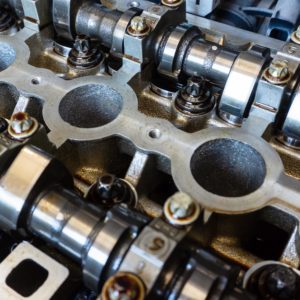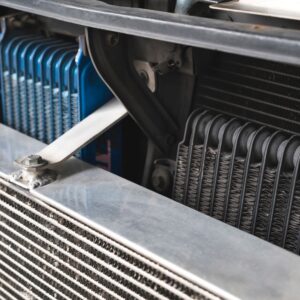The engine contains many oil seals and gaskets that help lock lubricant inside to grease and cool various parts. One of these critical engine parts is the camshaft seal. While made from tough materials and designed to deliver lasting performance, this seal might fail prematurely because of factors like its harsh working environment.
Fortunately, camshaft seals usually show one or more warning signs once they reach their last legs. Once you encounter any of these symptoms, replace the worn-out or damaged part immediately. Read on to find out the most common faulty camshaft seal symptoms.
What Is the Camshaft Seal?
The camshaft seal is the oil seal on one end of the camshaft or camshafts. Camshaft seals are only necessary on engines with timing belts. If the camshaft and timing chain are encased in a cover, the shaft doesn’t extend to the outside of the engine, so no seal is necessary.

Symptoms of a Bad Camshaft Seal?
Like any other part, the camshaft seal wears out over time. When the seal fails, it will cause issues that can harm the rest of the engine if ignored.
Fortunately, a faulty camshaft seal will also show warning signs. Here are the most common camshaft seal symptoms:
Oil Leak
Is engine oil seeping into other parts of the vehicle, like the wheels? Are there spots or even puddles of lubricant on the ground under the engine? Oil spots are the most prominent warning sign of an issue with the camshaft gasket: An oil leak.
You can usually find the camshaft seal on the cylinder head’s top toward the engine’s rear. Look near the firewall that divides the engine compartment from the passenger compartment.
The camshaft seal’s location makes it likely that any leaked oil will drip down the engine’s rear, often below the valve cover. Sometimes, the oil might flow to the engine’s corners or edges.
A bad camshaft seal isn’t the only possible cause of an oil leak. Other oil seals in the engine might fail. One such seal is the valve cover gasket, which you can find near the camshaft seal.
Smoke From Engine Bay
Can you see or smell smoke coming from the engine bay? It’s another sign that the camshaft seal may have failed and needs replacement.
Engine oil is a volatile fluid and will combust if it comes into contact with hot metal. Burning oil will generate smoke that might escape from the engine bay.
The size of the leak and associated oil loss will determine the smoke’s color and the amount produced. Minor leaks can lead to pale streaks wafting out of the engine bay. Conversely, sizable leaks can create considerable dark smoke that might make you think the entire engine caught fire.
Because of the camshaft seal’s position, engine oil leaking from the faulty seal can eventually reach the exhaust manifold or pipes. These parts run hot because of the exhaust gases passing through them.

Possible Causes of Camshaft Leaks and Failures
Camshaft seals have a finite lifespan. On average, a typical seal can last up to 80,000 miles. However, the seal can fail earlier than expected, especially if it sees heavy use.
Here are some of the common causes of camshaft seal failure:
Dried Seals
Chances are that the camshaft seal in your car’s engine is made of rubber. It’s cheap, strong, and flexible.
Unfortunately, rubber dries out over time, especially when exposed to extreme heat, like the temperatures in a running engine. Dry rubber turns hard and brittle, making it more likely to take damage.
A dried-out rubber camshaft seal cannot maintain a tight seal. Engine oil can seep through the gap between the joint and the shrinking seal. If the seal itself cracks, oil can leak through the fracture.
Too Much Oil Pressure
Oil constantly moves through the engine. Propelled by an oil pump, fresh lubricant enters the motor to cool and grease the components. On vehicles with overhead camshafts, there is a pressurized oil feed through the head gasket that feeds lube oil to the camshaft bearings, and the bearing nearest the timing belt gear must contain the pressure.
On vehicles with overhead camshafts, there is a pressurized oil feed through the head gasket that feeds lube oil to the camshaft bearings, and the bearing nearest the timing belt gear must contain the pressure.
– Richard McCuistian, ASE Certified Master Automobile Technician
So what can cause high oil pressure? Typically it’ll be a stuck oil pump relief valve because the relief valve is what regulates the oil pressure.
More About the Camshaft Oil Seal
Camshaft seals are mechanical seals, devices that assist mechanisms and systems in staying joined together. They stop leaks, maintain pressure, and keep contaminants outside the system.
Most camshaft seals are made of rubber. The material is flexible yet tough, making it well-suited for gaskets that must fit joints as tightly as possible.
What Does the Camshaft Seal Do?

The camshaft seal’s job is to seal one end of the camshaft. It prevents engine oil from leaving the crankcase through the opening it plugs.
A worn-out or failed camshaft seal will leak engine oil, reducing the lubricant immediately available to lubricate the camshaft. Without sufficient amounts of grease, the camshaft can run hot and grind against other engine parts.
Contaminants might also enter through the camshaft seal’s damaged section. If dirt, dust, moisture, or rust gets inside the crankcase, they can cause problems that might force you to replace the camshaft or other expensive parts.
How Much Does a Replacement Camshaft Seal Cost?
In the market for a quality replacement camshaft seal? Be prepared to shell out anywhere between $10 and $50. Always check the compatibility of the new seal with your vehicle before placing your order.
Where to Get a New Camshaft Seal for Your Vehicle
Replacing a small part like the camshaft seal can save your daily driver from major engine damage. As a responsible car owner, you should always choose to be preventive instead of reactive, and staying on top of maintenance tasks like replacing a worn-out camshaft seal can help you save hundreds of dollars on repairs.
Shopping for an OE-grade camshaft seal is extremely easy if you do it here at CarParts.com. We have high-quality camshaft seals that match your vehicle’s specifications, taking the guesswork out of finding the right products for your ride. Simply enter your vehicle’s year, make, and model into our vehicle selector to start browsing compatible camshaft seals for your car, SUV, or truck.
Thanks to our strategically located warehouses across the US, you can get your camshaft seal delivered straight to your doorstep in as fast as two business days. All our products also come with a lifetime replacement and low-price guarantee, helping you get the best value for your money.
Don’t miss out on the best deals on the market, and shop for a top-notch camshaft seal today!
Any information provided on this Website is for informational purposes only and is not intended to replace consultation with a professional mechanic. The accuracy and timeliness of the information may change from the time of publication.






























